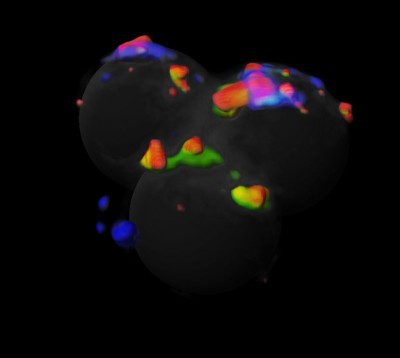Single-cell genomics to combat inflammation

Husband-and-wife team Marcel and Claudia Nold are using single-cell technologies to control inflammation — an important response to infection or injury which, nevertheless, can cause conditions such as diabetes, heart disease and Alzheimer’s disease if not carefully controlled.
“Inflammation is a double-edged sword: in many diseases, such as stroke, heart attacks and autoimmune diseases like Crohn’s disease and lupus, the immune system’s responses are too strong and can wreak great havoc if not sufficiently contained,” said Associate Professor Marcel Nold.
“Rampant, uncontrolled inflammation leads to tissue damage, which, in the unfortunately not-uncommon severe cases, can result in organ failure and death.”
Based at the Hudson Institute of Medical Research, the Nolds and their colleagues recently discovered the mechanisms by which interleukin 37 (IL-37), a cytokine of the IL-1 family, acts to regulate immune responses and to control inflammation in the body. Their study was published in the journal Nature Immunology.
The team found that, to achieve its powerful protective effects, IL-37 uses a pair of very specific receptors on target cells. Binding of these two receptors triggers IL-37 to instruct target cells to execute a cascade of events, which subdue some of the molecular pathways by which the body mounts inflammatory responses.
“IL-37 has been shown to override the body’s destructive responses to injury and disease, and our experiments will further probe how we can block or mimic its function,” Associate Professor Nold said.
“We hope this discovery could be harnessed to suppress inflammation in all different kinds of scenarios, from autoimmune diseases to the common cold, and to unleash the immune system’s own desired and targeted attacks on various cancers.”
The Nolds’ research last month received a boost from the inaugural $50,000 Fielding Innovation Award, which supports a Hudson Institute scientist who is producing major advancements in the commercialisation of their research. According to Dr Claudia Nold, the award will “greatly help us to get the extensive amount of work done that our laboratory needs to accomplish over the next 12 months and beyond in order to take our findings through to a commercial stage”.
The team’s next step will use single-cell technology, located at the Hudson Institute’s Single Cell Genomics Centre, to analyse the activity of genes controlling the receptor’s function. As noted by Hudson Institute Associate Director Professor Paul Hertzog, single-cell genomics allows enables scientists to “isolate each individual cell from a diseased organ or tumour to establish which cells are actually causing the disease, or responding to a treatment”.
“By allowing scientists to analyse the transcription of thousands of genes at the single-cell level, the technology enables researchers to identify different cell types that have, until now, remained out of reach,” he said.
The Single Cell Genomics Centre was officially opened today by Parliamentary Secretary for Medical Research Frank McGuire, who will tour the state-of-the-art facility to learn about the groundbreaking research being enabled by single-cell technology. The centre has also been named a Single Cell Centre of Excellence by biotechnology company Fluidigm, making it the first facility in the Southern Hemisphere to receive such an honour.
The centre will next month relocate to the Monash Health Translational Research Facility (TRF) — the result of a partnership between the Hudson Institute, Monash Health and Monash University. The $87.5 million building will enable single-cell genomics research to be more actively translated into patient treatments, with an entire floor dedicated to clinical trials.
European Space Agency inaugurates deep space antenna in WA
The ESA has expanded its capability to communicate with scientific, exploration and space safety...
Black hole collision supports Hawking's landmark theory
Astrophysicists have witnessed a collision between two black holes that was so loud, they were...
Uncovering differences in wild and domesticated crops
Researchers have revealed insights into the genetic make-up of wild varieties of common crops...



